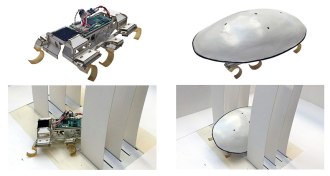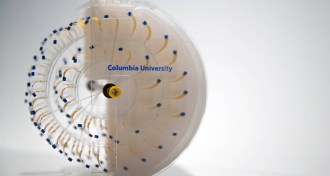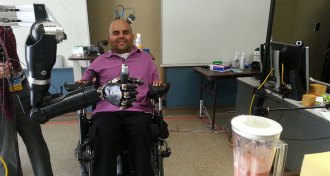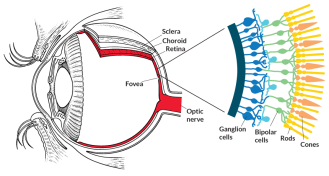Tech
Sign up for our newsletter
We summarize the week's scientific breakthroughs every Thursday.
-
 Tech
TechPlastic shell lets roach-bot squeeze through gaps
An arched shell helps a six-legged robot shimmy past obstacles.
By Meghan Rosen -
 Science & Society
Science & SocietyYour photos reveal more than where you went on vacation
By mining public databases of people’s photos, researchers can explore changing landscapes and tourist behavior.
-
 Health & Medicine
Health & MedicineE-cigarette reports provide science that society craves
Research on vaping fills a crucial need in science’s service to society: providing the best information possible in a timely manner, so people can make wise choices.
By Eva Emerson -
 Earth
EarthLeap second helps us with the reality of time
A leap second will be inserted at the end of the day on June 30.
-
 Tech
TechNew app creates a searchable network of species worldwide
A free new app compiles millions of records of species worldwide and allows users to add sightings.
-
 Planetary Science
Planetary Science50 years ago, Mariner 4 sent back first pictures from Mars
On July 14, 1965, Mariner 4 became the first spacecraft to fly by Mars. The probe also sent back the first pictures of another planet taken from space.
-
 Microbes
MicrobesSpore-powered engines zoom ahead
Engines that run on the dehydration of bacterial spores can power a tiny car and an LED.
By Beth Mole -
 Tech
TechHumanoid robot tops other bots in defense agency’s challenge
A humanoid robot named DRC-HUBO won first place in DARPA’s Robotic Challenge, held June 5-6.
By Meghan Rosen -
 Chemistry
ChemistryQuantum chemistry may be a shortcut to life-changing compounds
Quantum chemistry could launch a manufacturing revolution, helping to identify materials for improved solar cells, better batteries or more effective medicines.
-
 Neuroscience
NeuroscienceBrain implants let paralyzed man move robotic arm
Implanting tiny silicon chips in the action-planning part of a paralyzed man’s brain let him smoothly control a robotic limb with his thoughts.
By Meghan Rosen -
 Genetics
GeneticsHow to rewire the eye
The cutting-edge technology called optogenetics may offer a workaround to partially restore vision even after the retina’s light-sensing rods and cones die.
-
 Math
MathComputer program rivals top poker players in complex card game
A computer program held its own against the world’s best heads-up no-limit Texas Hold’em poker players.
By Andrew Grant